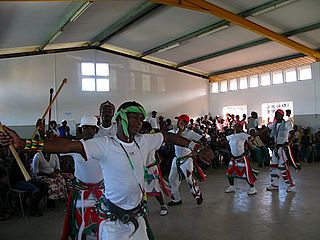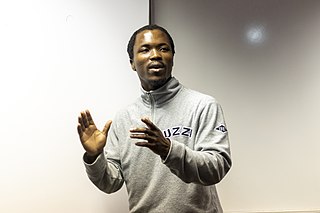
Abahlali baseMjondolo is a socialist shack dwellers' movement in South Africa which primarily campaigns for land, housing and dignity, to democratise society from below and against xenophobia.
Slum/Shack Dwellers International (SDI), is a global social movement of the urban poor that started in 1996. It forms a network of community-based organisations in more than 30 countries across Africa, Asia, Latin America and the Caribbean.

Sibusiso Innocent Zikode is the president of the South African shack dwellers' movement, which he co-founded with others in 2005. Abahlali baseMjondolo claims to have an audited paid up membership of over 115 000 across South Africa. His politics have been described as 'anti-capitalist'. According to the Mail & Guardian "Under his stewardship, ABM has made steady gains for housing rights."

Kennedy Road is an informal settlement in Durban (eThekwini), in the province of KwaZulu-Natal in South Africa. Formed in the late 1970s or early 1980s, the settlement was mentioned by the African National Congress (ANC) after the end of apartheid but amenities were not improved. The site is mostly not connected to sanitation or electricity. Dissatisfaction with local councillors led to 2005 protests including a road blockade, out of which the shack dwellers movemment Abahlali baseMjondolo (AbM) formed. In 2009, an AbM meeting was attacked resulting in two deaths and a court case. More recently, the municipality has improved facilities and promised to relocate inhabitants.

UnFreedom Day is an unofficial annual event that is marked every year on or around 27 April. UnFreedom Day is organised to counter the official South African holiday called Freedom Day, an annual celebration of South Africa's first democratic elections in 1994.

The Poor People's Alliance was network of radical grassroots movements in South Africa. It was formed in 2008 after the Action Alliance, formed in December 2006, was expanded to include two more organisations. It become defunct following the collapse of two of its affiliated movements, the Western Cape Anti-Eviction Campaign and the Landless People's Movement.
Marie Huchzermeyer is an academic and public intellectual at the School of Architecture and Planning at the University of the Witwatersrand in Johannesburg, South Africa.
Rubin Phillip is bishop of the Anglican Diocese of Natal. The great-grandchild of indentured labourers from Andhra Pradesh, Phillip is the first person of Indian heritage in South Africa to hold the position of Bishop of Natal. He grew up in Clairwood, a suburb of Durban with a large concentration of people of Indian descent, in a non-religious household, but converted to Christianity. He was a noted anti-apartheid activist and spent three years under house arrest in the 1970s and was banned in 1973. He was enthroned as bishop in February 2000.
Willies Mchunu was the 7th Premier of KwaZulu-Natal province in South Africa. He was previously a Member of the Executive Council (MEC) for the Department of Transport, Community Safety, and Liaison in the province. He is a member of the African National Congress and the former chairperson of the South African Communist Party (SACP) in KwaZulu-Natal and is a member of the Central Committee of the SACP. He is seen as a close ally of former South African President Jacob Zuma.
The attack on Kennedy Road in Durban, South Africa, occurred on 26 September 2009. A mob of men armed with bush knives, guns and bottles entered the Kennedy Road informal settlement searching for leaders of the shackdwellers movement Abahlali baseMjondolo (AbM). They looted shacks and threatened residents, before attacking a hall where a youth meeting was happening. Two people were killed and around a thousand were displaced. In the aftermath, AbM representatives such as S'bu Zikode went into hiding and thirteen AbM members were arrested.
Michael Sutcliffe is the former municipal manager of the eThekwini Metropolitan Municipality, which includes the city of Durban, South Africa. During his time in the position he was widely reported to be a controversial figure amongst Durbanites and was the target of popular protest in the city.
The Constitution of South Africa protects all basic political freedoms. However, there have been many incidents of political repression, dating back to at least 2002, as well as threats of future repression in violation of this constitution leading some analysts, civil society organisations and popular movements to conclude that there is a new climate of political repression or a decline in political tolerance.
Fire is a serious hazard in shack settlements in South Africa. It has been argued that "On average in South Africa over the last five years there are ten shack fires a day with someone dying in a shack fire every other day." In 2011, 151 were reported to have been killed in shack fires in Cape Town. It was reported that in 2014, 2,090 people burned to death in the Gauteng province, "many of them in shack fires that sweep through informal settlements".
There have been many political assassinations in post-apartheid South Africa. In 2013 it was reported that there had been more than 450 political assassinations in the province of KwaZulu-Natal since the end of apartheid in 1994. In July 2013 the Daily Maverick reported that there had been "59 political murders in the last five years". In August 2016 it was reported that there had been at least twenty political assassinations in the run up to the local government elections on the 3rd of August that year, most of them in KwaZulu-Natal.
In March 2013 around a thousand people occupied a piece of land in Cato Crest, Durban and named it Marikana after the Marikana miners' strike. Mayor James Nxumalo blamed the occupation on migrants from the Eastern Cape. He was strongly criticised for this by the shack dwellers' movement Abahlali baseMjondolo who said that "The City Hall is red with blood".
Nkululeko Gwala originally from Inchanga in KwaZulu Natal, was a resident of Cato Crest, which is part of Cato Manor in Durban, and a supporter of the Marikana Land Occupation (Durban). He was also a prominent member of the shackdwellers' social movement Abahlali baseMjondolo and chairperson of their Cato Crest Branch. He was assassinated on 26 June 2013.
Dear Mandela is a 2012 South-African/American documentary focusing on three friends who are members of the shackdwellers movement Abahlali baseMjondolo. They fight eviction by making a legal challenge against the KwaZulu-Natal Elimination and Prevention of Re-emergence of Slums Act of 2007 which ends up going to the final court of appeal, the Constitutional Court. The challenge is successful but swiftly results in a violent attack on the Kennedy Road informal settlement in 2009. The film-makers were themselves caught up in the attack.

The eKhenana Commune is a prominent land occupation in the historic working-class area of Cato Manor in Durban, South Africa. According to the Socio-Economic Rights Institute "The eKhenana settlement is organised as a cooperative in which residents collectively run a communal kitchen and tuck shop, theatre, poetry and music projects, and care for a vegetable garden named after the late Nkululeko Gwala [assassinated in 2013] as well as a poultry farm named in honour of the late S’fiso Ngcobo [assassinated in 2018]. The Commune has solar power and is also home to a political school that residents named the Frantz Fanon School, as well as the Thuli Ndlovu Community Hall [Ndlovu was assassinated in 2014]. The Commune has suffered sustained political repression, including multiple arrests and three assassinations in 2022.

Lindokuhle Mnguni was a land activist and a prominent leader in the shack dwellers' movement Abahlali baseMjondolo. He was chairperson of the movement's youth league as well as the chairperson of the eKhenana Commune. He was a leader of eKhenana's food sovereignty project which sought to make the commune more self-sustaining and independent. He was assassinated on 8 August 2022.










